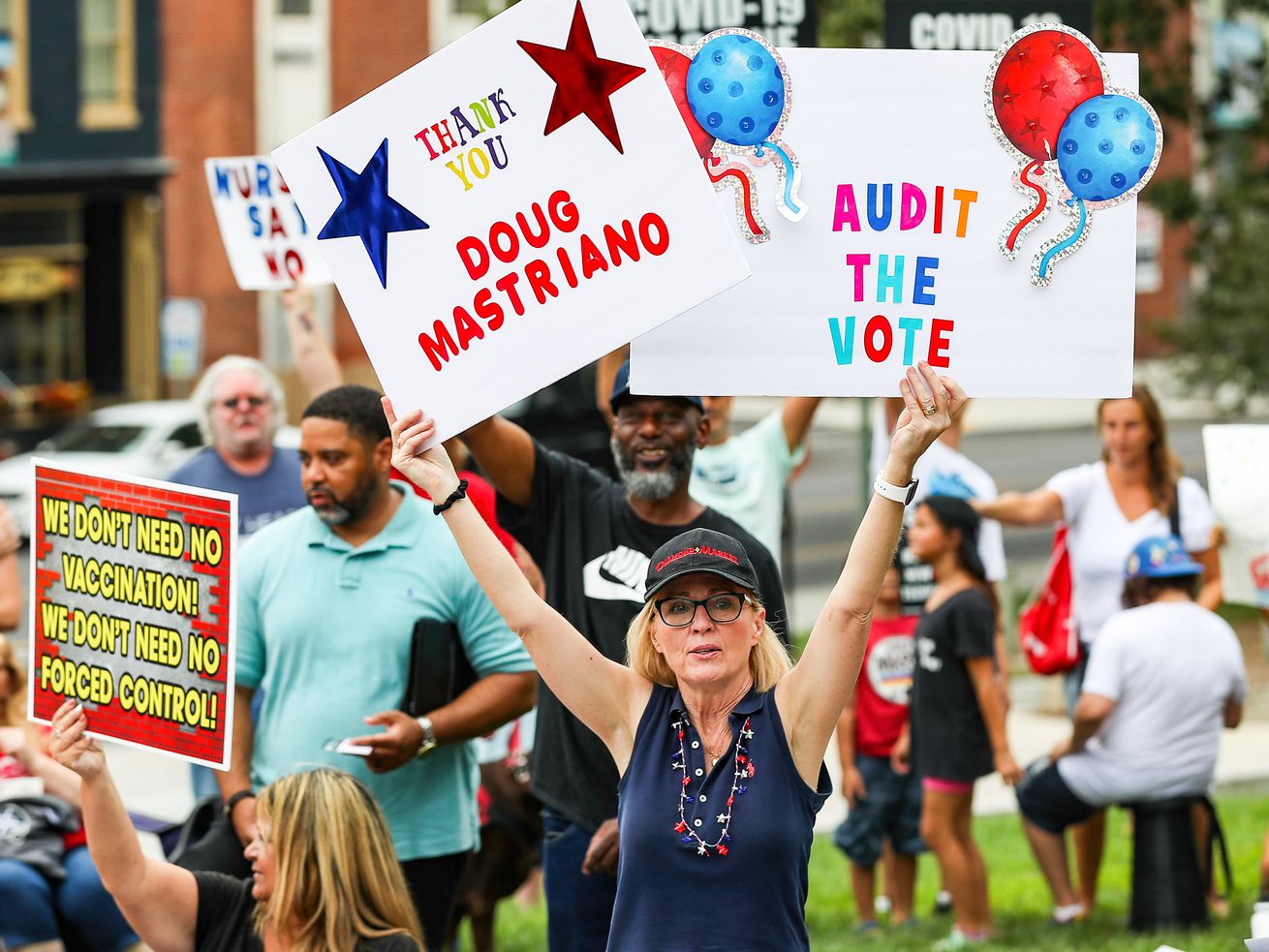GOP candidates in states including Wisconsin, Pennsylvania, and Arizona are laying the groundwork to challenge an unfavorable result.
Republican officials in key states stood in the way of former President Donald Trump’s attempts to overturn the 2020 election results.
But this year, according to recent Washington Post reporting, 54 of 87 GOP candidates running for positions with power over the way elections are certified in presidential battlegrounds have falsely claimed that the 2020 election was fraudulent, and say they would have done things differently. The next time a presidential candidate seeks out help overturning an election, they could find willing accomplices in these candidates.
Though there are candidates who have peddled Trump’s election lies in every projected 2024 battleground, Wisconsin, Pennsylvania, and Arizona present three scenarios for how bad actors — as secretaries of state or state attorneys general, in governors’ mansions or in state legislatures — could abuse their power over certifying elections to subvert a result they personally disagree with. Here’s how they could do it:
Wisconsin: A campaign to seize power from a bipartisan elections commission
How Wisconsin’s election system works:
The success of an effort to put Wisconsin’s elections in partisan hands would require cooperation from officials up and down the ballot there. Because of the checks and balances the state has put in place, overturning an election would mean getting sign-off from the winners of the secretary of state and gubernatorial races, as well as continued GOP dominance in state legislature contests.
What the GOP is doing:
Trump allies are targeting the Wisconsin Elections Commission, which administers elections and has the authority to investigate and prosecute violations of election laws. It was established in 2015 by the Republican-controlled state legislature and was intended to function similarly to the Federal Elections Commission, with three Republican and three Democratic appointees.
The commission has significant discretion over how elections are conducted, and plays a role in certifying election results. In 2020, after Republicans sought recounts in the large, heavily Democratic counties of Milwaukee and Dane based on false claims of fraud, the commission voted 5-1 to certify President Joe Biden’s victory.
State Republicans have since called for the dissolution of the commission, whose policies, they falsely argue, led to fraudulent votes that cost Trump reelection.
“The problem for Republicans is that the Wisconsin Elections Commission was pretty scrupulous. It did not tilt elections towards Republicans like they thought it would,” said Jay Heck, executive director of the democracy group Common Cause Wisconsin.
State Rep. Amy Loudenbeck, the Republican nominee for Wisconsin secretary of state, is one of those Republicans seeking to dismantle the commission and to re-empower the secretary of state’s office to preside over the state’s elections for the first time since the 1970s. (Before the commission, there was the Government Accountability Board, which also ran elections.)
If a Republican secretary of state presided over elections, they could tighten up rules around voting, from identification requirements to who could cast an absentee ballot and where they could drop it off — policies that, individually, might not cause a huge drop-off in voting, but together, amount to “death by a thousand cuts,” Heck said. And, if the secretary of state did assume the commission’s current power to certify the election results, they could try to disrupt that process as well.
Republican legislators introduced a bill expanding the secretary of state’s powers earlier this year, but it didn’t go up for debate before the end of the legislative session. State Republicans also fast-tracked a package of bills earlier this year aiming to strip the Wisconsin Elections Commission of its power and resources and force it to answer to the state legislature. So long as Republicans maintain their big majorities in both chambers, as they’re expected to, voting rights groups warn that these measures are likely to pass.
The legislature isn’t expected to have a veto-proof majority, however, and that makes who becomes governor important.
Wisconsin’s Democratic Gov. Tony Evers, who has supported the Wisconsin Elections Commission, is one of the most vulnerable incumbent governors across the country this year. His GOP opponent, construction magnate Tim Michels, has repeatedly echoed Trump’s election lies and has said that he’s open to decertifying Biden’s 2020 win in the state, even though there is no legal means to do so. The Cook Political Report rates the race a toss-up.
How bad it could get:
Essentially, Heck said, “Republicans are trying to weaken the Wisconsin Elections Commission for 2024 so that, when Trump runs again and Wisconsin will again be a very closely divided state, the election apparatus would be able to make decisions that would be very favorable for a Republican presidential candidate.”
Pennsylvania: Where the governor can unilaterally shape elections
How Pennsylvania’s election system works:
The biggest threat to the 2024 election in Pennsylvania is state Sen. Doug Mastriano, the Trump-endorsed Republican nominee for governor.
Mastriano’s an ardent MAGA Republican who bused hundreds of people to Washington, DC, and was outside the US Capitol on the day of the January 6, 2021, insurrection. He was also a key figure in Trump’s efforts to overturn the 2020 election results in Pennsylvania. Mastriano organized a state Senate hearing featuring Trump lawyer Rudy Giuliani, an unauthorized audit of voting machines that ultimately cost him a committee chair position, and a scheme to send fake electors who were favorable to Trump to Congress.
If elected, he would have the power to appoint Pennsylvania’s top election official, the “Secretary of the Commonwealth.” He hasn’t named who he intends to appoint if elected, but he’s indicated that it would be an individual who shares his philosophy on elections.
“As governor, I get to appoint the secretary of state. And I have a voting reform-minded individual who’s been traveling the nation and knows voting reform extremely well,” Mastriano told Steve Bannon, former chief strategist for Trump, in an April interview. “That individual has agreed to be my secretary of state.”
Elections in Pennsylvania are decentralized, with county officials holding most of the power over how elections are conducted. But the secretary of state still plays a key role, largely by issuing guidance; in 2020, for example, they gave county election boards direction on how to interpret a new law that allowed vote-by-mail statewide.
How bad it could get:
Mastriano has indicated he’s interested in a secretary of state who would use that power to restrict access to voting. He notably proposed making everyone re-register in an effort to purge voter rolls of dead voters and those registered to nonexistent addresses — an action that he claims the secretary of state could take unilaterally.
Secretaries of state in Pennsylvania can also choose to participate in defending challenges to election law. And they have to certify the voting machines selected by each of Pennsylvania’s counties. (Mastriano has suggested that he would decertify all of the state’s voting machines “with the stroke of a pen” via his secretary of state.)
Finally, they gather the election results from the counties and certify them. No one has ever refused to certify them, but that’s what watchdogs worry Mastriano’s pick for secretary of state would do.
“If you refuse to do that, you’d run into a situation where there would be litigation, but it would certainly throw a wrench into the process,” Jessica Marsden, counsel for Protect Democracy, a nonprofit focused on preserving fair and free elections, said.
Also worrying to pro-democracy experts are the ways Mastriano’s shown that he can activate supporters; his involvement in January 6 in particular has put voting rights groups on high alert for political violence.
“He has an ability to galvanize people to turn out in person and [do] harm,” said Salewa Ogunmefun, executive director of the voting rights group Pennsylvania Voice.
Arizona: A state that could be completely led by election deniers
All of the Republican nominees for the top three statewide offices in Arizona — state attorney general nominee Abraham Hamadeh, secretary of state nominee Mark Finchem and gubernatorial nominee Kari Lake — have made Trump’s 2020 election lies central to their campaigns.
None of them say they would have certified the results, suggesting that they might challenge an unfavorable result in 2024 if given the chance. Lake even preempted her own primary win by saying that she would challenge the results if she lost because it would have indicated “there’s some cheating going on.”
How Arizona’s election system works:
Each would have a role to play in the election certification process in 2024. Every county in Arizona has to separately certify their election results via the county board of supervisors; those results then get transmitted to the secretary of state. On the fourth Monday following a general election, the secretary of state canvasses the certified results from the counties in the presence of the governor and the state attorney general.
It’s not clear what the legal implications might be if the governor or attorney general didn’t show up for that step, and that could present a potential opportunity for Lake or Hamadeh to delay or undermine the certification, Marsden said.
The secretary of state is then supposed to formally certify the result, and the governor has an additional responsibility to sign the certificate of ascertainment that names the slate of electors, and send it to Congress. The governor could theoretically refuse to sign the certificate or sign a certificate with a slate of electors that didn’t match up with the popular vote.
How bad it could get:
If elected, Finchem would also have some control over the basic rules of how the election is conducted. Among other proposals, he wants to eliminate early voting entirely.
“That would certainly disenfranchise lots of voters and also potentially cause a lot of chaos in an election system that has for years relied on a substantial number of people voting earlier,” Marsden said. And Finchem has, as a state lawmaker, backed legislation that would allow the GOP-controlled state legislature to overturn the results of a future presidential election, allowing it to instead award delegates to its chosen candidate.
Should Hamadeh, Finchem, and Lake try to exploit their offices to overturn the election results, Marsden said, “There would certainly be litigation that would follow … But I think it would certainly increase the chance of a major election crisis.”
Even if they aren’t successful in materially impacting the results, they could still do significant damage to voter confidence. State officials “have really crucial megaphones to either bolster or cast doubt on election results,” Marsden said.
Author: Nicole Narea
Read More



